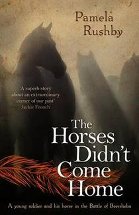The horses didn't come home by Pamela Rushby

Angus and Robertson, 2012. ISBN 9780 7323 9354 3.
(Ages: 12+) Highly recommended. WW1. The Battle at Beersheba,
dubbed the last great cavalry charge in history, occurred on October
31 1917, when the Australian 4th Light Horse Brigade charged over 6
kilometres to take the Turkish held town. The horses had already
been ridden for 2 days to get there and needed rest and water. What
happened to them afterwards is the climax of Pamela Rushby's
absorbing book.
She presents the story of Laura and Harry in alternate chapters,
giving the reader a different point of view of the war, one from the
home front, with Laura at school in Brisbane, knitting socks for
soldiers, and sending letters to her brother, and the other from her
brother Harry, part of the Light Horse Brigade, training in Egypt
before being sent to fight in the Sinai and Palestine Campaign in
the Middle East. Harry's letters include those from Bunty, Laura's
horse, written by Harry for his sister.
When Harry joined the regiment, part of the reason behind his
enlistment was to be able to take his own horse, but on the
departure day, his horse fell lame, and so Laura bravely gave him
her beloved horse, Bunty, a waler, a tough Australian breed of
horse.
So, incredibly the reader has three points of view, and Rushby
cleverly entwines us into the story of Bunty and others like him as
the tale unfolds. We know from the start that horses did not go home
with their riders, so the tale has more than a twinge of sadness all
the way through.
The descriptions of the battles in which Harry and his friend, Jack,
take part are most effectively told, and reflect both the writing
skill and wide ranging research of the writer. The end of the
book includes a glossary of terms used in the novel, author's
notes which includes a background to the Sino-Palestine Campaign,
and a bibliography, all of which is of immeasurable use. The map at
the start of the book too is most useful.
When we hear so much about Anzac which to many means only Gallipoli
and Anzac Cove, it is salutary to read of other campaigns in which
Australians have taken part, and this one, reflecting as it does on
the treatment of the horses taken overseas, will bring all of the
readers up short, widening their perspective and knowledge of
Australia's involvement in war.
Fran Knight